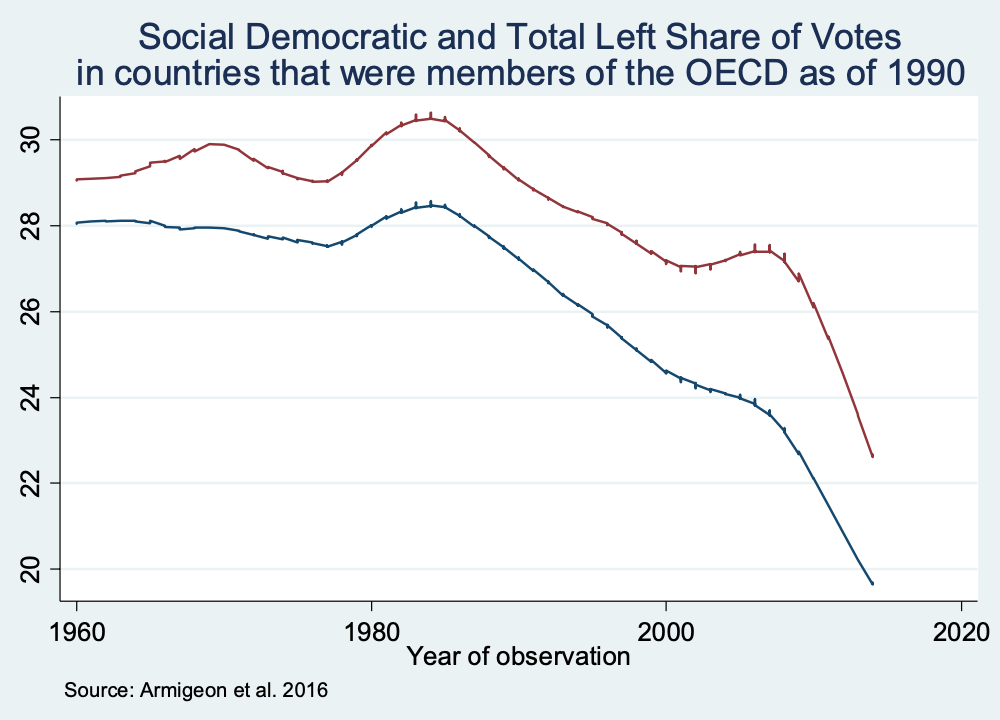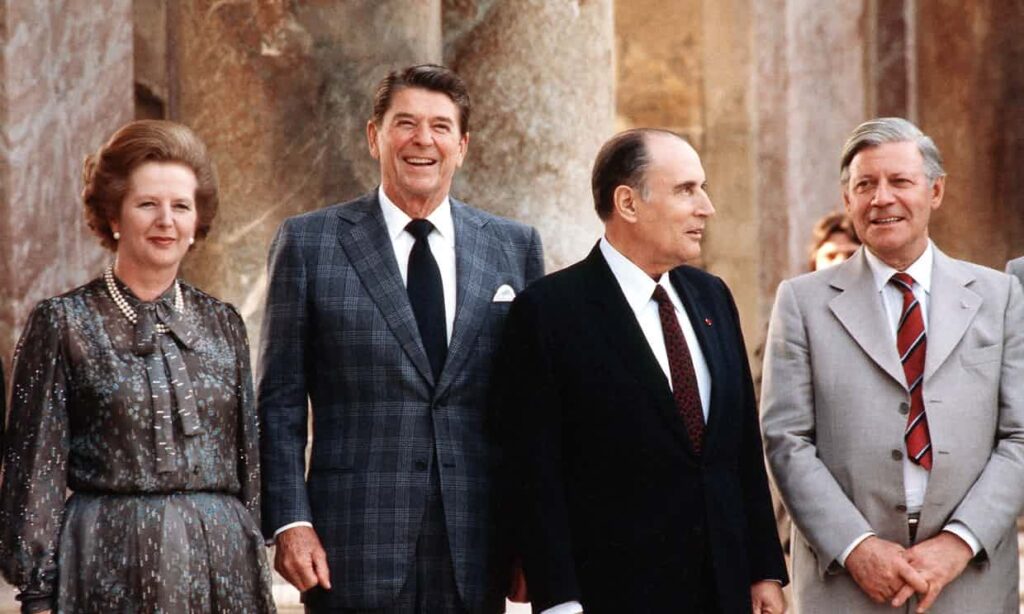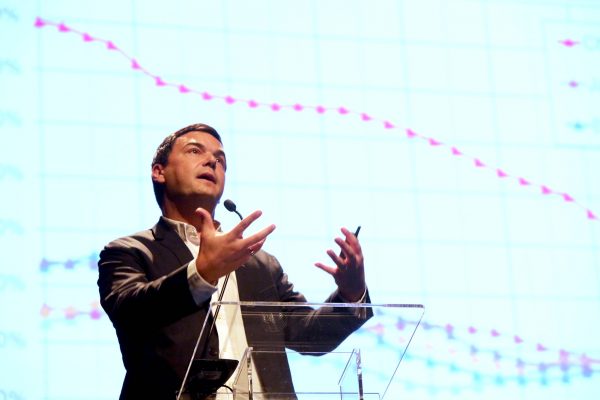Editors’ Note: This is an adapted chapter from a forthcoming book, Market Economies, Market Societies: Interviews and Essays on the Decline of Social Democracy, published by Phenomenal World. Click here for more information.
Some time in 1991 I was invited to give a talk to the Andalusian Confederation of the Spanish Socialist Workers’ Party (PSOE). Afterward, the secretary of the confederation walked me back to my hotel. I asked him why there was a widespread atmosphere of demoralization within the party. Nos hicieron hablar un idioma que no era el nuestro, he answered: “They made us speak a language that was not ours.”
Note that the secretary did not evoke the industrial restructuring of the 1980s, which significantly reduced the party’s industrial working class base. Nor did he refer to the emergence of television, which reduced the importance of the party machine in mobilizing that base. He also did not point to cultural transformations in Spanish society, which rendered new ideological dimensions politically salient. Instead, he identified the root of the party’s transformation in language—the language party leaders were expected to use to address their supporters, publicly interpret the world, and justify their policies. What was this language that was not “ours”?
To answer this question we have to go back in time and to venture beyond Spain. The two keywords of the socialist movements born in Europe in the second half of the nineteenth century were “working class” and “social revolution,” where the latter was expected to realize the “ultimate goal” of abolishing the class system. Yet when socialist parties entered into electoral competition and, for the first time, gained parliamentary power in the aftermath of World War I, “ultimate goals” were not sufficient to mobilize electoral support or to govern. As political leaders, socialists had to offer a program of immediate improvements to the life conditions of the public. Moreover, socialists learned to dilute or obscure the language of class in order to win elections. While communists continued to adhere to “class contra class” strategy, socialists formed coalitions and fronts aimed at appealing to “the people.”
Thus reformism was born: the strategy of proceeding toward socialism by steps, through electoral expression of popular support. The social democratic view of the world was one in which there was no choice between reform and revolution. There was nothing strange about French Socialist Jean Jaurès’s argument that “precisely because it is a party of revolution . . . the Socialist Party is the most actively reformist.” He further notes:
I do not believe, either, that there will necessarily be an abrupt leap, the crossing of the abyss; perhaps we shall be aware of having entered the zone of the Socialistic State as navigators are aware of having crossed the line of a hemisphere—not that they have been able to see as they crossed a cord stretched over the ocean warning them of their passage, but that little by little they have been led into a new hemisphere by the progress of their ship.
But even if reaching socialism would be imperceptible, socialism remained the goal. “Revolution” would be accomplished by accumulating reforms.
Following the success of the Swedish Social Democrats in the 1930s, and in the aftermath of World War II, the Keynesian welfare state institutionalized a compromise between organizations of workers and of capitalists across Western Europe. Gradually abandoning Marxism, social democrats accepted the tenet announced in the German Social Democratic Party’s Godesberg program of 1959: markets when possible, the state when necessary. Social democrats were to administer capitalist societies with the goals of liberty, employment, and equality. And they did accomplish much: they strengthened political democracy, introduced a series of improvements to work conditions, reduced income inequality, expanded access to education and health, and provided a foundation of material security for most people, while promoting investment and growth.
But because it left the property structure intact and allowed markets to allocate resources, the social democratic approach fuelled the causes of inequality at the same time that it aimed to mitigate them. This contradiction reached its limits in the 1970s. As many old ills were overcome, new ones emerged. Indeed, the list of problems to be resolved by socialist programs in the mid-1970s was not any shorter than it had been at the turn of the twentieth century.
The constraints of capitalist economy turned out to be inexorable, and political defeats meant that reforms could be reversed. In office in most Western European countries, social democratic governments desperately searched for responses that would preserve their commitment to “ultimate goals” in the face of the economic crisis. During the early 1970s, socialist parties developed new energy policies, workers’ management schemes, and structures of economic planning. But James Callaghan’s loss to Margaret Thatcher in the United Kingdom in 1979, and the departure of communists from François Mitterrand’s government in France in 1984, administered fatal blows. Mitterrand’s turn to austerity was the final act of resignation in the face of domestic and international constraints. All that was left were successive “third ways.”
The evolution of social democracy until the advent of neoliberalism has been extensively documented. The capitulation of the left to the neoliberal offensive is more puzzling. It is thus revealing to get a glimpse of how social democratic leaders saw the future when they got the first whiff of the impending crisis of their long-term project. Fortunately, they were articulate about their fears, their hopes, and their plans. Particularly telling is an exchange of letters among German Chancellor Willy Brandt, Austrian Chancellor Bruno Kreisky, and Swedish Prime Minister Olof Palme on the eve of the first oil crisis of the 1970s.
The exchange included a series of letters and two in-person debates. It was initiated by Brandt on February 17, 1972 and ended with a conversation in Vienna on May 15, 1975. Brandt became chancellor of Germany in 1969, won reelection in 1972, and resigned in 1974. Kreisky became the Chancellor of Austria in 1970 and continued to serve until the summer of 1983. Palme came to office in Sweden in 1969, left after an electoral defeat in 1976, returned to office in 1982, and was assassinated in 1986. Hence, all the three were in office through most of the period of correspondence.
The exchange took place after the collapse of the Bretton Woods system in 1971 and during the onset of the first oil crisis of the 1970s. The economic situation was changing in dire ways. Between October 1973 and March 1974 oil prices increased by about 300 percent. Unemployment in OECD countries rose from an average 3.2 percent between 1960 and 1973 to 5.5 percent between 1974 and 1981; inflation rose during the same periods from 3.9 percent to 10.4 percent, and GDP growth rate fell from 4.9 percent to 2.4 percent.
Brandt initiates the exchange with a call to discuss the fundamental values of democratic socialism. Quoting the Godesberg Program, he declares that the goal of social democrats is to create a society “in which all men could freely develop their personality and cooperate in the political, economic, and cultural life of humanity as members of the community.” This transformative orientation is immediately echoed by Palme: “social democracy is more than a party charged to administer the society. Our task is much more to transform it.” Kreisky even more explicitly refers to the ultimate goal: “Socialists . . . want to eliminate classes and justly divide the product of work of the society.”
Echoing Jaurès, all three reject the choice between reform and revolution. For Brandt it is an artificial distinction “because no one can seriously deny that all reforms tending to increase our sphere of liberty do not also contribute to a transformation of the system.” Palme rejects the idea of a violent revolution as “elitist,” claims that reformism is based on the support of social movements, and sees reformism as nothing but a “process to improve the system.” Kreisky is less certain about the cumulative effect of reforms and more specific about the reforms that would have transformative effects, but he also believes that “there is always a moment in which the quantity [of reforms] becomes transformed into quality.”
All three also worry about the relation between long-term goals and current policies. Resolutely democratic, they condition the progress of reforms on popular support, and they welcome cooperation with other political forces. Yet whatever their commitment to long-term goals, they are leaders of political parties, with the responsibility to win elections. They are acutely aware that people will condition their support on bread-and-butter issues, not on goals far off in the horizon, so this is what preoccupies them. As Palme writes:
It is the problems of everyday life which occupy men most. . . . The relation between the ideas and the practical questions must be explained. . . . It is not sufficient to say: We need to modify the system. All efforts in this direction must be attached to solving human problems.
And problems there were: income inequality and capital concentration were intensifying, unemployment was rising, natural resources were limited, and the environment was increasingly under threat. “Sooner or later,” Kreisky notes, “we will face the problem of how far we can guide ourselves by our principles in practical politics.” He worries about the rise of multinational corporations, environmental limits to growth, and the depreciation of manual work. The letters are forward looking: the three discuss structural reforms that would advance their fundamental values.
On December 2, 1973, the three meet to discuss the consequences of the oil crisis. Brandt recognizes that it constitutes a decisive breakthrough for industrialized countries and will require serious efforts to cope with. Kreisky strikes the first alarm bell:
There is something that seems very important to me, namely, our lack of foresight in matters of social policy. There has been a particularly dangerous development. It was believed that crises like the one in the early 1930s could not be repeated. Yet we now see how from one day to the next political events came to weigh on our economic situation a threat of global proportions which, just a few months ago, would have been held to be impossible. . . . We suddenly see that we confront a situation the seriousness of which cannot be minimized.
Palme spells out the difficulty:
We told the people who were already enjoying a prosperous situation that things would be much better for their children and that we would be able to solve the outstanding problems. . . . [But the new situation] presents a much more difficult task to fulfill. Because from the moment there is no longer a constant surplus to be distributed, the question of distribution is appreciably more difficult to resolve.
Brand echoes these concerns, noting that it is essential to prevent inequality from increasing as growth resumes. Eighteen months later, during another in person meeting on May 25, 1975, Kreisky makes the fiscal constraint even more explicit: “It is precisely now that reforms should be made. It is just a question which. If we strongly develop social policies, we will not be able to finance them.”
As a result, they desperately search for a distinct social-democratic response. “Social Democracy,” Kreisky emphasizes, “must find its own response to the crisis of modern industrial society.” Brandt rejects the accusation that “we have become a party confined to tactical maneuvers. The program of 1959 does not separate us in any way from the grand objectives of the German and international workers’ movement.” They agree that some reforms—those in the realm of social policies—have become much more difficult, but they emphasize that reforms that extend democracy to the economic realm by introducing employee co-management, as well as new energy and environmental policies and increased state intervention in the economy, are not only still possible but necessary. While Palme reflects that “the time of simplistic belief in progress is irrevocably gone,” he searches for a new “third way” between “private capitalism” and “bureaucratic State capitalism of Stalinist variety,” offering a detailed eleven-point program of reforms. And Brandt admonishes that “the effort to reform the society must not cease.”
The reforms did not cease. After Brandt resigned in 1974, his successor Helmut Schmidt pursued stimulus policies, albeit paying increasing attention to fiscal constraints and reducing some public expenditures, until he was removed in 1982 by a vote of no confidence in favor of Helmut Kohl. Palme lost the election in 1976 but returned to office in 1982, restoring most cuts to social policies instituted by the interim government but emphasizing wage restraint and abandoning Keynesian policies. Kreisky won several elections and remained in office until 1983, continuing to expand social policies, particularly in education and health. Hence, while the shadow of fiscal and foreign exchange deficits tempered the reforms, the reformist zeal was not abandoned.
What are we to make of this period? As the figure below shows, electoral support for social democratic parties and the left as a whole peaked in the early 1980s and continued to decline ever since.

Social Democratic (blue) and Total Left (red) share of votes in countries that were members of the OECD as of 1990. Source: Klaus Armingeon et al., “How the Euro divides the union: the effect of economic adjustment on support for democracy in Europe,” Socio-Economic Review, 2016.
Explanations of the electoral decline of social democracy are many, but this is not what I aim to examine here. Parties bearing social democratic or socialist labels may do better or worse electorally; the deeper question is whether the content of their vision has changed. And in response to the shrinking of their traditional base of industrial workers, the rise of neoliberal ideology, the liberalization of capital flows and subsequent tightening of fiscal constraints, and the necessity to defend national currencies against financial speculation, it is indisputable that the language of social democracy did fundamentally change. We get a sense of this language in Brandt, Kriesky, and Palme’s references to fiscal constraints generated by the oil crisis. We hear it in former Italian prime minister Giuliano Amato’s understanding of “the need to balance social rights with financial stability.” I heard it personally from former Brazilian president Fernando Henrique Cardoso, whom I asked what he finds most constraining as the president, and to which he answered, “the market.”
These constraints are real. Former Spanish prime minister Felipe González once told me that the run on the peseta in 1986 cost Spain the equivalent of the national health budget in a few days. Slow growth, inflation, unemployment, large fiscal deficits, and balance of payments crises did not leave socialist governments much room to maneuver. The Maastricht Treaty, which went into effect in 1993, was intended to be a solution to these problems, but it came at the cost of tying the hands of social democrats behind their backs: with a limit of 3 percent on annual deficits and of 60 percent on the ratio of debt to GDP, Keynesian stimulation was nearly impossible, and increased social expenditures tightly circumscribed. As the right moved to the right, the left moved even farther to the right, and the economic policies of the center-left and the center-right became almost indistinguishable. Social democrats embraced liberalization of capital flows, free trade, fiscal discipline, and labor market flexibility, abstained from counter cyclical policies and from using most industrial policies.
For fifty years social democrats had believed that equality promotes efficiency and growth. In the words of Swedish Social Democratic minister Bertil Ohlin, social expenditures “represent an investment in the most valuable productive instrument of all, the people itself.” Yet suddenly they adopted the neoliberal verbiage about “trade-offs”—between “equality and efficiency,” between “equality and growth.” The world became full of “dilemmas” and “trilemmas.” The sociologist Anthony Giddens invented as many as five dilemmas (none of them agreeing with the logical sense of the term). “The government can do only so much,” social democrats echoed the right. “Responsibility,” a key word in the Thatcherite lexicon, was shifted from the state to individual citizens. As Giddens preached, “One might suggest a prime motto for the new politics, no rights without responsibilities.” And in addition to this linguistic turn, social democrats ran out of ideas. In the grandiosely entitled chapter, “A New Capitalist Order,” from his 2010 book Freefall: America, Free Markets, and the Sinking of the World Economy, the economist Joseph Stiglitz urged the same reforms of the postwar period: governments should maintain full employment and a stable economy, they should promote innovation, provide social protection and insurance, and prevent exploitation. So much for “new.”
Looking back, the trajectory from the late nineteenth century to the late twentieth is stark. The Hague Congress of the First International in 1872 had proclaimed that the “organization of the proletariat into a political party is necessary to insure the victory of social revolution and its ultimate goal: the abolition of classes.” The first Swedish program specified that “Social Democracy differs from other parties in that it aspires to completely transform the economic organization of bourgeois society and bring about the social liberation of the working class.” Socialists were going to abolish exploitation, to eradicate the division of society into classes, to remove economic and political inequalities, to finish the wastefulness and anarchy of capitalist production, to eradicate all sources of injustice and prejudice. They were going to emancipate not only workers but humanity, to build a society based on cooperation, to rationally orient energies and resources toward satisfaction of human needs, to create social conditions for an unlimited development of personality.
These turned out not to be feasible goals. But the vision of transforming the society survived for nearly one hundred years, even when it was imperative to cope with immediate crises, even when some ideas—most prominently nationalization of the means of production—revealed themselves to be mistaken, and even when social democrats experienced political defeats. This is what faded at the end of the 1970s. Referring to the reforms of the 1980s, Amato reflects, “Little by little, we’ve reduced public expenditure beyond the point which enabled the continuation of social rights, to the point where it has deteriorated them.” González is also nostalgic: “What worries me is that to some degree social democracy died of success. It died because it couldn’t understand that the society that it had helped create was not the society which existed when it started.” The historian of the French Communist Party Roger Martelli, commenting on the Mitterrand government, is most bitter: “The recurrent problem with the left when it comes to power is a time lag. When the left came to power in 1981, most of the countries of the Western world were already experiencing the neoliberal counter-revolution.”
The title of the Brandt, Kreisky, and Palme exchange was Social Democracy and the Future. But this may have been the last time when social democrats struggled to maintain a transformative perspective while coping with an immediate crisis. Perhaps social democrats have transformed as much as they could have; perhaps they have succeeded in making some of their reforms irreversible. They have adapted to cultural changes, promoted gender equality, and became keenly aware of the impending environmental catastrophe. Nothing in this essay is intended to question their achievements. But any vision of a common future to which they would orient their societies faded under the onslaught of the immediate obstacles. What was no longer “ours” for the Andalusian secretary was a language that does not extend beyond a program for the next election, a language that does not guide the society toward long-term goals. And this is what we must regain.









